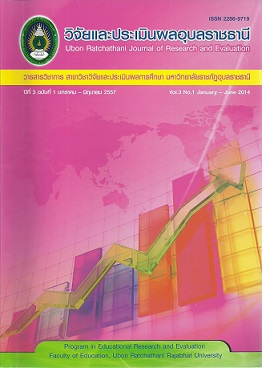การปฏิบัติการพัฒนาทักษะการสนทนาภาษาอังกฤษเพื่อการสื่อสาร โดยใช้วิธีสอน แบบเอ็กซ์พลิซิท วิชาภาษาอังกฤษ สำหรับนักเรียนชั้นประถมศึกษาปีที่ 5 กลุ่มเครือข่ายสถานศึกษาที่ 23 เหล่าเสือโก้ก (2) สังกัดสำนักงานเขตพื้นที่การศึกษาประถมศึกษาอุบลราชธานี เขต 1
บทคัดย่อ
การวิจัยครั้งนี้วัตถุประสงค์ 1) เพื่อการปฏิบัติการพัฒนาทักษะการสนทนาภาษาอังกฤษเพื่อการสื่อสาร โดยวิธีสอนแบบเอ็กซ์พลิซิท วิชาภาษาอังกฤษ ของนักเรียนชั้นประถมศึกษาปีที่ 5 2) เพื่อเปรียบเทียบผลสัมฤทธิ์ทางการเรียนหลังเรียนของนักเรียนกลุ่มทดลองกับเกณฑ์ที่ตั้งไว้ของการปฏิบัติการพัฒนาทักษะการสนทนาภาษาอังกฤษเพื่อการสื่อสาร โดยวิธีสอนแบบเอ็กซ์พลิซิท วิชาภาษาอังกฤษ ของนักเรียนชั้นประถมศึกษาปีที่ 5 และ 3) เพื่อเปรียบเทียบผลสัมฤทธิ์ทางการเรียนก่อนและหลังการปฏิบัติการพัฒนาทักษะการสนทนาภาษาอังกฤษเพื่อการสื่อสาร โดยวิธีสอนแบบเอ็กซ์พลิซิท วิชภาษาอังกฤษ ระหว่างกลุ่มทดลองและกลุ่มควบคุม ประชากรนักเรียนชั้นประถมศึกษาปีที่ 5 ของโรงเรียน ในกลุ่มเครือข่ายสถานศึกษาที่ 23 เหล่าเสือโก้ก (2) จำนวน 11 โรงเรียน รวม 116 คน กลุ่มทดลองนักเรียนชั้นประถมศึกษาปีที่ 5 โรงเรียนบ้านแต้ใหม่ จำนวน 20 คน กลุ่มควบคุมนักเรียนชั้นประถมศึกษาปีที่ 5 โรงเรียนบ้านดูน จำนวน 17 คน ได้มาโดยวิธีเลือกแบบเจาะจง เครื่องมือที่ใช้เก็บรวบรวมข้อมูล ได้แก่ แผนการจัดการเรียนรู้โดยใช้การสอนวิธีสอนแบบเอ็กซ์พลิซิท วิชาภาษาอังกฤษ จำนวน 10 แผน แบบวัดทักษะการสนทนาภาษาอังกฤษเพื่อการสื่อสาร แบบฝึกท้ายกิจกรรมวัดความรู้ความเข้าใจ แบบบันทึกประจำวันของครู สถิติที่ใช้ร้อยละ ค่าเฉลี่ยส่วนเบี่ยงเบนมาตรฐาน และการทดสอบค่า t-test โดยใช้สถิติ Non-Parametric และเปรียบเทียบความแตกต่างของคะแนนเฉลี่ยระหว่างกลุ่มทดลองและกลุ่มควบคุมโดยใช้สถิติ Mann-Whitney U
ผลการวิจัยพบว่า
- การจัดกิจกรรมการเรียนรู้ตามแผนการจัดการเรียนรู้วิธีสอนแบบเอ็กซ์พลิซิทเพื่อพัฒนาทักษะการสนทนาภาษาอังกฤษเพื่อการสื่อสารวิชาภาษาอังกฤษ ด้วยกระบวนการวิจัยปฏิบัติการ ส่งผลให้การสอนมีประสิทธิภาพโดยครูจัดการเรียนรู้ด้วยวิธีสอนแบบเอ็กซ์พลิซิทตามกระบวนการ 6 ขั้นตอนดังนี้ 1) ขั้นทบทวนเนื้อหาและตรวจการบ้าน 2) ขั้นการเสนอเนื้อหาใหม่ โดยครูแจ้งจุดประสงค์การเรียนรู้และสอนเนื้อหาสาระอย่างละเอียด 3) ขั้นการปฏิบัติโดยครูให้การแนะนำอย่างต่อเนื่อง 4) ขั้นการให้ข้อมูลย้อนกลับและวิธีแก้ไข เพื่อช่วยให้นักเรียนได้คำตอบที่ชัดเจนถูกต้อง 5) ขั้นให้ฝึกโดยอิสระนักเรียนสามารถปฏิบัติได้อย่างอัตโนมัติ 6) ขั้นทบทวนรายสัปดาห์และรายเดือน
- การเปรียบเทียบการจัดกิจกรรมการเรียนรู้โดยใช้แบบทดสอบวัดทักษะการสนทนาภาษาอังกฤษเพื่อการสื่อสารวิชาภาษาอังกฤษก่อนและหลังการพัฒนา พบว่า นักเรียนมีทักษะการสนทนาภาษาอังกฤษเอการสื่อสาร หลังเรียนสูงกว่าก่อนเรียน อย่างมีนัยสำคัญทางสถิติที่ระดับ .01 โดยมีค่าคะแนนหลังปฏิบัติการพัฒนาวิธีสอนแบบเอ็กซ์พลิซิททั้ง 3 วงจรปฏิบัติการ คิดเป็นร้อยละ 77.50 ของจำนวนนักเรียนที่ผ่านเกณฑ์ที่กำหนดร้อยละ 100
- การเปรียบเทียบผลสัมฤทธิ์ทางการเรียนวิชาภาษาอังกฤษระหว่างกลุ่มทดลองและกลุ่มควบคุม พบว่า นักเรียนในกลุ่มทดลองที่ใช้วิธีสอนแบบเอ็กซ์พลิซิทมีผลสัมฤทธิ์ทางการเรียนสูงกว่ากลุ่มควบคุมที่ใช้วิธีสอนแบบปกติ อย่างมีนัยสำคัญที่ระดับ .01
เอกสารอ้างอิง
สุมิตรา อังวัฒนกุล. วิธีสอนภาษาอังกฤษ.พิมพ์ครั้งที่ 4. กรุงเทพฯ : สำนักพิมพ์แห่งจุฬาลงกรณ์มหาวิทยาลัย, 2540.
ธีรวุฒิ เอกะกุล. การวิจัยปฏิบัติการ.พิมพ์ครั้งที่ 3. อุบลราชธานี : ยงสงวนอินเตอร์กรุ๊ป, 2553.
ประวิต เอราวรรณ์. การวิจัยในชั้นเรียน (ฉบับปรับปรุงใหม่). กรุงเทพฯ : ประสานมิตร, 2545.
วัชรา เล่าเรียนดี. เทคนิคและยุทธวิธีพัฒนาทักษะการคิด การจัดการเรียนรู้ที่เน้นผู้เรียนเป็นสำคัญ. นครปฐม : โรงพิมพ์มหาวิทยาลัยศิลปกร, 2550.
ดาวน์โหลด
เผยแพร่แล้ว
รูปแบบการอ้างอิง
ฉบับ
ประเภทบทความ
สัญญาอนุญาต
1. บทความที่ตีพิมพ์ในวารสารนี้ได้มีการตรวจสอบการลอกเลียนงานวรรณกรรมแล้ว ไม่เกินร้อยละ 25
2. บทความที่ตีพิมพ์ในวารสารนี้เป็นข้อคิดเห็น ข้อค้นพบของผู้เขียนบทความ โดยผู้เขียนบทความต้องเป็นผู้รับผิดชอบต่อผลทางกฎหมายใด ๆ ที่อาจเกิดขึ้นจากบทความนั้น ๆ
3. บทความ ข้อมูล เนื้อหา รูปภาพ ฯลฯ ที่ได้รับการตีพิมพ์ในวารสารวิจัยและประเมินผลอุบลราชธานี ถือเป็นลิขสิทธิ์ของวารสารวิจัยและประเมินผลอุบลราชธานี หากบุคคลหรือหน่วยงานใดต้องการนำทั้งหมดไปเผยแพร่ต่อหรือเพื่อกระทำการใดๆ จะต้องได้รับอนุญาตเป็นลายลักษณ์อักษรจากวารสารวิจัยและประเมินผลอุบลราชธานีก่อนเท่านั้น และจะต้องมีการอ้างอิงวารสารวิจัยและประเมินผลอุบลราชธานี ฉบับนั้น ๆ ด้วย






